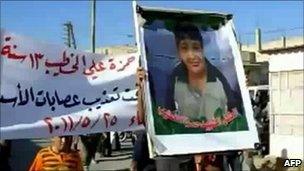Syria unrest: Hamza al-Khatib a symbol of uprising
- Published

Hamza al-Khatib's death has spurred on the Syrian protest movement
Arab revolutions - and associated social and international media - seem to thrive on icons, and the Syrian revolt appears to have found one, in the form of a 13-year-old boy from a village near the southern city of Deraa.
Hamza Ali al-Khatib took part in a demonstration on 29 April that ended up with shooting and bloodshed at a military housing complex at Saida, outside Deraa.
From that point on, there are two divergent narratives as to what happened between then and 21 May, when Hamza's body was handed over to his family.
The official account, as told on Syrian state TV after his death became a cause celebre, was that Hamza was hit by three bullets at the Saida complex and died on the spot.
It said his body was discovered and taken to the Deraa morgue that evening, where the pathologist identified the three bullet wounds as the cause of death.
It attributed the delay in handing over the body to the family to the fact that its identity was not yet known.
'Tortured to death'
But the account that has turned Hamza al-Khatib into an iconic figure for the Syrian revolution, and made his name known around the world, is very different.
It says Hamza was captured and tortured to death by security forces, and that when his body was handed over to his family, it showed the traces of cigarette burns and other signs of torture and mutilation, including emasculation, as well as bullet wounds.
Gruesome video footage of the body, posted on the internet and shown on al-Jazeera and other satellite stations, seemed to back up the claims.
Activist internet pages said that in order to retrieve the body, the family had to sign a paper promising to bury Hamza's remains immediately and keep quiet about it.
Credible sources had earlier said that in order to regain the bodies of loved ones, relatives in Deraa have routinely had to sign documents either admitting that the deceased was a terrorist, or that he or she had been shot by terrorists, not the security forces.
In a report covering the period concerned, Human Rights Watch said that more than 400 people have been killed in the Deraa area alone since late March, when the uprising began.
It concluded that torture of detainees there was routine, and that abuses amounting to crimes against humanity may well have been committed.
The official Syrian account insisted that the discoloration and other unusual signs on Hamza's body were the natural consequence of death several weeks previously.
The internet footage appeared to show bullet wounds to the chest and torso that would almost certainly have been fatal, consistent with the official account.
Facebook tributes
Coroner Akram Sha'ar, who Syrian TV said had examined the body within a few hours of death on the night of 29 April, said: "There were no traces of violence, resistance or torture, or any kinds of bruises, fractures, joint displacements or cuts".
Whatever the truth about how Hamza al-Khatib perished, his death has reverberated around Syria and well beyond.
Like the Egyptian and Tunisian revolutions before it, the Syrian uprising has sometimes shown signs of needing a new focal point or symbol to spur it on.
Hamza's picture has been raised at demonstrations in many towns, and at private indoor vigils by women holding placards saying "We are all the mothers of Hamza al-Khatib".
Facebook pages have been dedicated to his memory, and his death has been invoked by world leaders - including US Secretary of State Hillary Clinton and Australian Foreign Minister Kevin Rudd - to argue for further pressure on Bashar al-Assad's regime.
The latter has been scrambling to try to limit the damage.
President Assad invited Hamza's father and family to talks in Damascus on Tuesday, and promised a full investigation into the death.
They were quoted as being overwhelmed by his kindness and concern.
The Syrian state media are also referring to Hamza as a "martyr", a rare point of agreement with activists and the opposition.